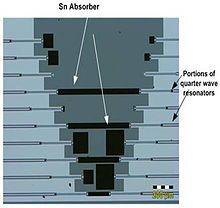
The kinetic inductance detector (KID) — also known as a microwave kinetic inductance detector (MKID) — is a type of superconducting photon detector capable of counting single photons whilst simultaneously measuring their energy and arrival time to high precision. They were first developed by scientists at the California Institute of Technology and the Jet Propulsion Laboratory in 2003.[1] These devices operate at cryogenic temperatures, typically below 1 kelvin. They are being developed for high-sensitivity astronomical detection for frequencies ranging from the far-infrared to X-rays.
- ^ Day, P. K.; LeDuc, H. G.; Mazin, B. A.; Vayonakis, A.; Zmuidzinas, J. (2003). "A broadband superconducting detector suitable for use in large arrays". Nature. 425 (6960): 817–821. Bibcode:2003Natur.425..817D. doi:10.1038/nature02037. PMID 14574407. S2CID 4414046.